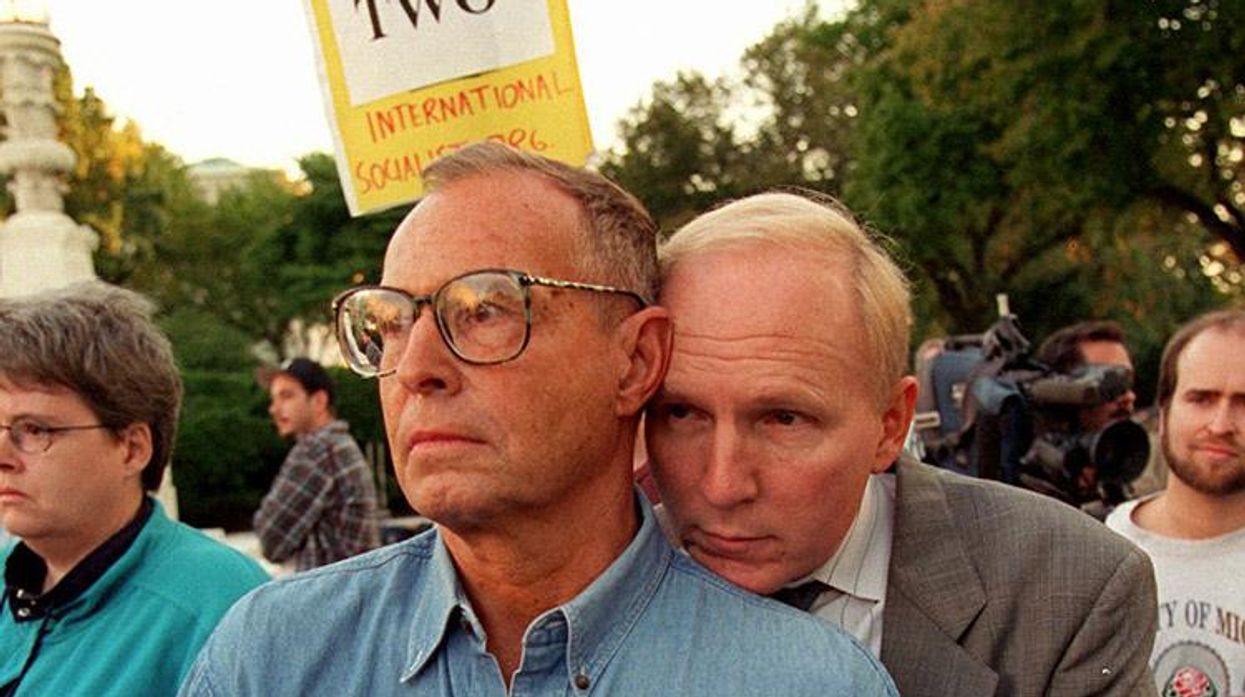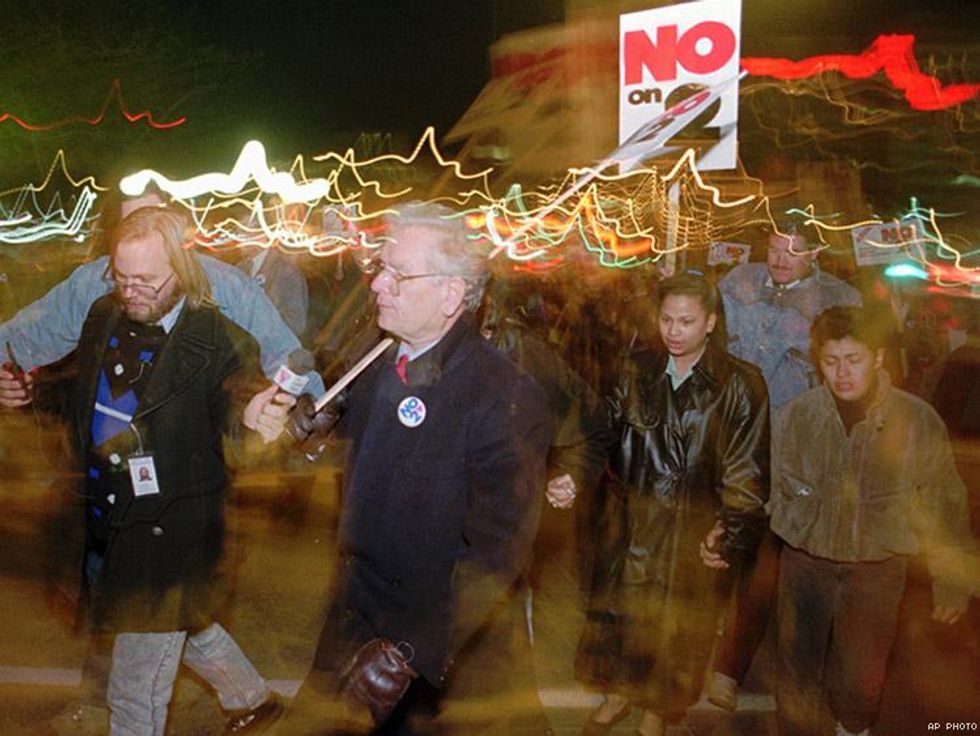A federal lawsuit aimed at dismantling North Carolina's sweeping anti-LGBT law is just getting under way, but the nation's high court already struck down an eerily similar law. That ruling celebrates two decades of precedent this month.
Imagine, for a moment, that a proactive city council votes to extend nondiscrimination protections to LGBT people. The ordinance guarantees equal access to public accommodations and freedom from discrimination in housing, employment, and health and welfare services. You know, the basics.
Then, a fervent backlash arises -- led by religious and political conservatives -- and all LGBT-inclusive nondiscrimination ordinances in the state are struck down in the heat of partisan overreaction. Further, local and state governments are prohibited from enacting these particular protections in any capacity. The American Civil Liberties Union and Lambda Legal file a federal lawsuit to stop the anti-LGBT law from taking effect.
This sounds a lot like North Carolina, where the state's Republican leaders are intensely defending House Bill 2, the draconian anti-LGBT law passed in a single day-long special session March 23.
But in reality, it's the background of a landmark case decided by the U.S. Supreme Court 20 years ago. In 1992, it was Colorado sanctioning anti-LGBT hate, and the portion of the LGBT community in the crosshairs were gay, lesbian, and bisexual residents. After several localities adopted nondiscrimination protections for their gay, lesbian, and bisexual residents (transgender people were not mentioned), a concerted conservative effort convinced 53 percent of the state's voters to adopt Amendment 2. The amendment, as proposed on the November 1992 ballot, asked Colorado voters whether the state constitution should be amended to prohibit "the state of Colorado and any of its political subdivisions from adopting or enforcing any law or policy which provides that homosexual, lesbian, or bisexual orientation, conduct, or relationships constitutes or entitles a person to claim any minority or protected status, quota preferences, or discrimination."
The resulting case was called Romer v. Evans, and the landmark 6-3 decision handed down in 1996 marked the first time the nation's high court ruled in favor of LGBT people.
Now, almost 20 years to the day since Romer was decided (May 19 marks two decades since Romer was handed down), legal advocates hoping to overturn North Carolina's anti-LGBT law are preparing to bring Romer's arguments back into the courtroom.
"You definitely feel deja vu when you put North Carolina side by side with what happened in Colorado 20 years ago," says Peter Renn, a staff attorney at Lambda Legal who serves as co-counsel on the federal lawsuit filed last month against North Carolina's law. "It seems like history is repeating itself. ... The common thread here is that, in both cases, the laws were born of animus toward our community. That's truly the common denominator."
If lawyers can prove that what happened in Colorado is a lot like what just happened in North Carolina, then not only would they undo HB 2, there's a chance the whole nation could gets its first landmark ruling affirming the basic rights of transgender people. While everyone The Advocate spoke to was adamant about winning the North Carolina case in lower courts, nothing is stopping the case from being appealed all the way up to the U.S. Supreme Court. If it was accepted at that level, it would be the first time the nation's high court had considered a case explicitly impacting transgender people.
North Carolina's attorney general, Democrat Roy Cooper, has refused to defend HB 2 in court, calling the law a "national embarrassment," and using his opposition to it as a boon to his gubernatorial bid, hoping to unseat incumbent Republican Gov. Pat McCrory. (Cooper's office declined The Advocate's repeated requests for additional comment.) But even without Cooper's legal support, there's no shortage of lawmakers and right-wing legal nonprofits lining up to defend McCrory and his fellow conservative supporters of the law, which they call a "common sense" response to a city's so-called legislative overreach.
The parallels between Colorado's Amendment 2 and North Carolina's House Bill 2 are striking.
It took less than 24 hours for the Republican-dominated North Carolina legislature and governor to introduce, pass and enact the sweeping anti-LGBT law that forces transgender people to use public restrooms (in government buildings) that do not match their gender identity, repeals all local nondiscrimination ordinances protecting LGBT residents, and prohibits cities and counties from adopting new ones. The law also bars North Carolinians from suing for discrimination in state courts.
Less than a week later, the American Civil Liberties Union, Equality North Carolina, and Lambda Legal filed a federal lawsuit against McCrory and his conservative colleagues leading the state, arguing that the law they called a special session to pass in record time violates the Equal Protection Clause of the Fourteenth Amendment to the U.S. Constitution -- the same basis on which Romer was decided. They'll also argue that HB 2 runs afoul of protections against sex-based discrimination guaranteed by Title IX of the Education Amendments of 1972, which has increasingly been interpreted to include protections against discrimination based on gender identity.
The lawsuit was filed on behalf of University of North Carolina Chapel Hill faculty member Joaquin Carcano, a 27-year-old transgender man whose ability to do his job at the university's Institute for Global Health and Infectious Diseases will be severely hindered by the new law, according to the complaint. Filed on March 28 in the U.S. District Court for the Middle District of North Carolina, the complaint details the harm HB 2 also inflicts on 20-year-old Payton Grey McGarry, a transgender student at UNC Greensboro who, prior to HB 2's passage, found acceptance among his fraternity brothers. Additional plaintiffs include Angela Gilmore, a married, African-American lesbian living in Durham who is a law professor and the associate dean for academic affairs at North Carolina Central University; a 17-year-old transgender girl named Hunter Schafer, who lives in the girls' dorm at UNC's School of the Arts High School in Winston-Salem; Beverly Newell, 45, and her wife Kelly Trent, 39, who allege that they were turned away from a fertility clinic in Charlotte after the passage of HB 2.
But if Romer is any indication, the stories of these plaintiffs won't be what ultimately wins the case for trans people and overturns the law.
 Above: Former Colorado Gov. Roy Romer (center) marches with LGBT people protesting the passage of Amendment 2 in 1992.
Above: Former Colorado Gov. Roy Romer (center) marches with LGBT people protesting the passage of Amendment 2 in 1992.
In fact, Carcano, et al., v. McCrory, et al., as the North Carolina case is titled, is the "natural heir" to the 1990s case out of Colorado, says one of the attorneys who worked on Romer. Matt Coles is a senior attorney at the American Civil Liberties Union and served as co-counsel for the plaintiffs. He points to one of the key findings of the Romer decision, authored by Justice Anthony Kennedy, as crucial. Kennedy dismissed the state's argument that it had some legitimate reason for passing Amendment 2, writing that "a bare desire to harm a politically unpopular group cannot constitute a legitimate governmental interest."
In other words, the architects of Colorado's law were themselves the deciding factor in determining whether the law was constitutional. In widespread rhetoric before the vote and pamphlets that denounced "special rights" for gays and lesbians, Amendment 2's backers revealed their true motivation -- and it had nothing to do with the public interest.
"I think it's going to be very, very difficult for North Carolina to offer any reason for what it did, other than hostility toward LGBT people," Coles tells The Advocate. "And if it's motivated by hostility, I think it's bad under Romer."
There's very little question about the motivation behind HB 2. Republican-led lawmakers in North Carolina called the special session March 23 with the express purpose of overriding a trans-inclusive ordinance passed in February by the Charlotte City Council. During the brief debate on the bill's merits on the Senate floor, lawmakers repeatedly referred to transgender women, specifically, as "men" in dresses, and alleged that letting trans people use the restroom that matches their gender identity would endanger women and children.
To be clear, there is not a shred of evidence to suggest that this fear-mongering has any basis in reality. While more than 200 localities currently enforce trans-inclusive ordinances (like the one approved in Charlotte), there has never been a single verified report in the U.S. of a transgender person assaulting a cisgender (nontrans) person in a restroom. Similarly, law enforcement officials around the country have soundly debunked the claim that trans-inclusive access policies create a "loophole" that will be exploited by sexual predators. That has simply never happened anywhere in the U.S. -- and regardless of any local ordinance, assault remains a crime, irrespective of the location where the attack takes place, or the victim or suspect's gender identity.
The Carcano complaint includes a detailed documentation of every piece of hateful rhetoric advanced by lawmakers as they rushed HB 2 through the legislative process. Senate president pro tempore Phil Berger said a vote in favor of the bill was a vote "to stop radical ordinance allowing men into public bathrooms with women and young girls." He went on to ask, "How many fathers are now going to be forced to go to the ladies' room to make sure their little girls aren't molested?"
That sentiment was echoed by state Sen. Buck Newton, a key sponsor who helped author the bill. Calling the Charlotte policy an "unlawful and reckless bathroom and locker room ordinance," Newton falsely claimed that the "municipality's top priority is allowing men into women's locker rooms and bathrooms."
Some lawmakers directly threatened harm to any transgender individuals who they might encounter in a public restroom. Responding to complaints about the special session's estimated $42,000 cost to taxpayers, state Sen. David Brock offered an ominous retort:
"You know, $42,000 is not going to cover the medical expenses when a pervert walks into the bathroom and my little girls are in there."
Elizabeth Gill, a senior staff attorney with the ACLU who is serving as co-counsel on the Carcano case, says everything about the way HB 2 was passed is cause for concern and invites legal scrutiny.
"The incredibly truncated passage time of HB 2 -- not allowing for there to be a full debate and a full discussion of who transgender people are -- is really troubling," says Gill. "And it does seem that really this is just based on a classic definition of animus: You just don't like people for who they are."
The attorneys litigating the Carcano case will be standing on the shoulders of a historic shift in the way the U.S. legal system treats LGBT Americans, that began with Romer.
That's why, although he's not working on the Carcano case out of North Carolina, Coles is optimistic about its chances.
"This case is going to to come to the federal courts with a much stronger and more richly developed pedigree [than Romer had]," he explains. "There's a lot that's [been] going on in over 20 years between Romer and now. ... It isn't just that North Carolina's law singles out gay people based on hostility. It's that North Carolina's law singles out, based on hostility, a group of people whose relationships are protected, independently, by the federal constitution. I think that makes it even more vulnerable."
Coles is alluding to the Supreme Court's landmark 2003 ruling in Lawrence v. Texas, which struck down antisodomy laws nationwide, largely on the premise that the Fourteenth Amendment guarantees adults the right to form primary relationships with anyone of their choosing. That case effectively determined that people who form a primary relationship with someone of the same sex -- in other words, gay, lesbian, and bisexual people -- are exercising a basic constitutional right that must be extended to all citizens.
That functional definition helped shift the legal perspective about LGBT people -- moving away from the dominant interpretation that homosexuality was a series of so-called deviant behaviors, and instead determining that what consenting adults do in the privacy of their own home is a constitutionally protected right, regardless of the genders of the adults involved. In other words, Lawrence helped the U.S. legal system define gay, lesbian, and bisexual people as people, rather than a group of individuals choosing to engage in a particular series of sex acts.
A decade after Lawrence was handed down, the Supreme Court took another step in affirming the rights of same-sex couples to marry, when it effectively gutted the federal Defense of Marriage Act in a case brought by lesbian widow Edie Windsor. Then, exactly two years later, five justices on the Supreme Court made clear that LGBT Americans have a fundamental right to marry a person of the same sex. Last June's landmark decision in Obergefell v. Hodges confirmed, once and for all, that the U.S. Constitution does protect the right of gay, lesbian, and bisexual people to legally wed the person of their choosing.
Much like these cases legitimized the long-voiced complaints of gay, lesbian, and bisexual Americans, Carcano has the potential to do the same thing for the harms perpetrated against transgender Americans.
"This could set further precedent," says Lambda Legal's Renn, noting that the explicit targeting of transgender people in HB 2 is "unprecedented."
While the Carcano case will rely on the precedent set by these landmark victories, it won't be a line-for-line rehashing of Romer. Whereas the law in Colorado explicitly mentioned LGB people, North Carolina's HB 2 does not include the words "gay," "lesbian," bisexual," or "transgender," which is par for the course in contemporary anti-LGBT legislation.
Instead, HB 2 bars local governments from enacting nondiscrimination protections for any classification not already in state law. And because North Carolina has no employment, education, or public accommodations protections for LGBT people, HB 2 effectively prohibits cities and counties from protecting their LGBT residents.
All of the attorneys who spoke with The Advocate maintain that the most insidious provisions of HB 2 are the law's requirement that transgender people use public restrooms and other gender-segregated facilities that do not match their gender identity. Even though the law does not use the word "transgender," the functional definition of who gets to use which restroom gives away lawmakers' intentions.
"Public agencies shall require every multiple occupancy bathroom or changing facility to be designated for and only used by persons based on their biological sex," reads the law. It defines "biological sex" as "the physical condition of being male or female, which is stated on a person's birth certificate."
"We know what that means," says Coles. "People whose gender identity is different than the gender they were assigned at birth is what trans people are. And the fact [lawmakers] don't use the word, I don't think helps them."
He doesn't believe the courts -- or the people of North Carolina -- will be convinced by specious arguments claiming that lawmakers passed HB 2 to protect public safety. He points to the long history, especially in the American South, of legislators trying to justify discriminatory laws with red herrings to cover up the true motivation behind the laws.
That was a tactic often employed by states attempting to defend their constitutional bans on same-sex marriage, where attorneys representing the states would claim that the law was not targeting gay people for being gay, but simply determining that residents could only marry a person of the opposite sex. It wasn't discriminatory because it applied to everyone equally, these states argued.
"That got laughed out of court, as indeed it should have been," Coles concludes. "I think that North Carolina has tried to be artful, but the law, when it's functioning rightly, focuses on substance, not form. And I don't think that anyone's going to have any doubt about what [HB 2] was about."


 Above: Former Colorado Gov. Roy Romer (center) marches with LGBT people protesting the passage of Amendment 2 in 1992.
Above: Former Colorado Gov. Roy Romer (center) marches with LGBT people protesting the passage of Amendment 2 in 1992.


































































Charlie Kirk DID say stoning gay people was the 'perfect law' — and these other heinous quotes